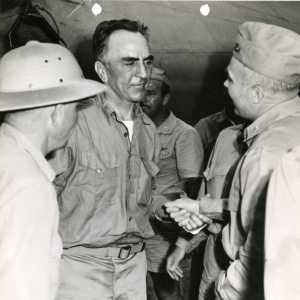~ Hall of Heroes ~ Eddie Rickenbacker Info from here . |
|
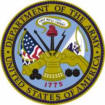  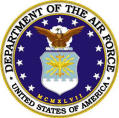 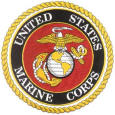 
|
Edward Vernon Rickenbacker (October 8, 1890 – July 27, 1973) was an American fighter ace in World War I and Medal of Honor recipient. He was also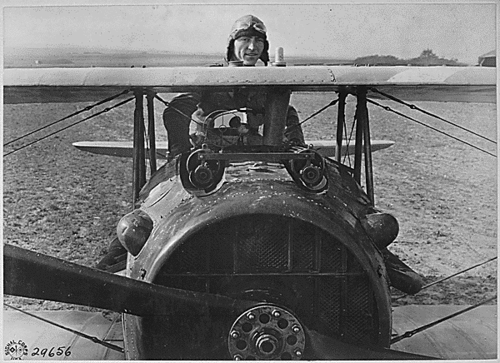 a race car driver and automotive designer, a government consultant in military matters and a pioneer in air transportation, particularly as the longtime head of Eastern Air Lines. a race car driver and automotive designer, a government consultant in military matters and a pioneer in air transportation, particularly as the longtime head of Eastern Air Lines. He was born Edward Rickenbacher (without a middle name) in Columbus, Ohio to German-speaking Swiss immigrants. From childhood, he loved machines and experimented with them, encouraged by his father's words: "A machine has to have a purpose". In what was to become one of the defining characteristics of Rickenbacker's life, he nearly died many times in events ranging from an early run-in with a horse-drawn carriage, to a botched tonsillectomy, to airplane crashes. His first near death experience occurred when he was in the "Horsehead Gang". He lived near a mine, and they decided to ride a cart down the slope. It tipped over and almost crushed them. According to Rickenbacker's autobiography, at age thirteen, his schooling ended in grade seven after the accidental death of his father on August 26, 1904. However, according to Eddie Rickenbacker: An American Hero in the Twentieth Century, by W. David Lewis, his father died after an altercation with another man in Columbus. Rickenbacker found jobs to help support the family, but driven by an intense admiration for machines, Rickenbacker taught himself as much as he could, including enrolling in a correspondence course in engineering. He aggressively pursued any chance of involvement with automobiles. Rickenbacker went to work at the Columbus Buggy Company, eventually becoming a salesman. 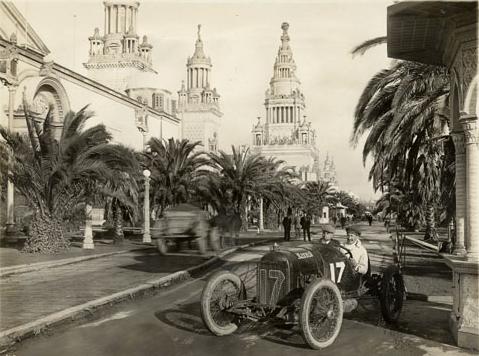 Rickenbacker became well-known as a race car driver, competing in the Indianapolis 500 four times before World War I, and earning the nickname "Fast Eddie". Rickenbacker joined the Maxwell Race Team in 1915 after leaving Peugeot. After the Maxwell team disbanded that same year, he joined the Prest-O-Lite team as manager and continued to race improved Maxwells for Prest-O-Lite. Rickenbacker became well-known as a race car driver, competing in the Indianapolis 500 four times before World War I, and earning the nickname "Fast Eddie". Rickenbacker joined the Maxwell Race Team in 1915 after leaving Peugeot. After the Maxwell team disbanded that same year, he joined the Prest-O-Lite team as manager and continued to race improved Maxwells for Prest-O-Lite. |
Rickenbacker wanted to join the Allied troops in World War I, but the US had not yet entered the war. He had several chance encounters with aviators, 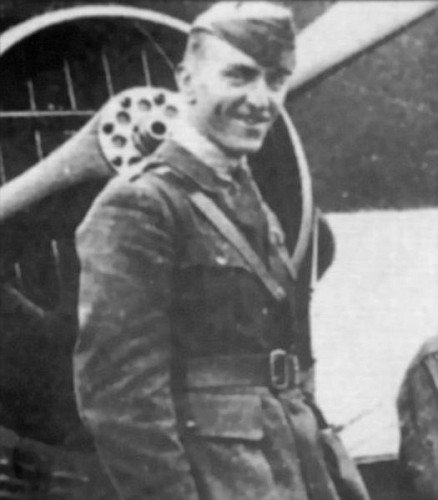 including a fortuitous incident in which he repaired a stranded aircraft for T. F. Dodd, a man who later became General John J. Pershing's aviation officer and an important contact in Rickenbacker's attempt to join air combat. including a fortuitous incident in which he repaired a stranded aircraft for T. F. Dodd, a man who later became General John J. Pershing's aviation officer and an important contact in Rickenbacker's attempt to join air combat. During World War I, with its anti-German atmosphere, he—like many other German Americans—changed his surname; the "h" in "Rickenbacher" became a "k" in an effort to "take the Hun out of his name." As he was already well known at the time, the change received wide publicity. "From then on", as he wrote in his autobiography, "most Rickenbachers were practically forced to spell their name in the way I had..." He believed his given name "looked a little plain." He signed his name 26 times, with a different middle initial each time. After settling upon "V", he selected "Vernon" as a middle name. In 1916, Rickenbacker traveled to London, with the aim of developing an English car for American races. Because of an erroneous press story and Rickenbacker's known Swiss heritage, he was suspected of being a spy. En route and in England, agents closely monitored his actions. On a sea voyage back to America, he came up with the idea to recruit his race 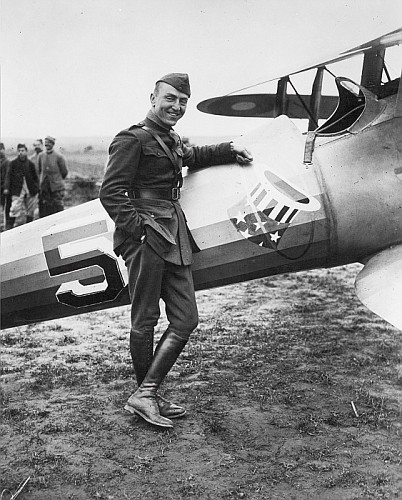 car driver friends as fighter pilots, on the theory that such men were accustomed to tight spaces and high speeds. His suggestion was ignored by the military. car driver friends as fighter pilots, on the theory that such men were accustomed to tight spaces and high speeds. His suggestion was ignored by the military. When, in 1917, the United States declared war on Germany, Rickenbacker had enlisted in the United States Army and was soon training in France with some of the first American troops. He arrived in France on June 26, 1917 as a Sergeant First Class. Most men chosen for pilot training had college degrees and Rickenbacker had to struggle to gain permission to fly because of his perceived lack of academic qualifications. Because of his mechanical abilities, Rickenbacker was assigned as engineering officer at the 3rd Aviation Instruction Center at Issoudun, the US Air Service's pursuit training facility, where he practiced flying during his free time. He learned to fly well, but because his skills were so highly valued, Rickenbacker's superiors tried to prevent him from attaining his wings with the other pilots. Rickenbacker demonstrated that he had a qualified replacement, and the military awarded him a place in one of America's air combat units, the 94th Aero Squadron, informally known as the "Hat-in-the-Ring" Squadron after its insignia. Originally he flew the Nieuport 28, at first without armament. On April 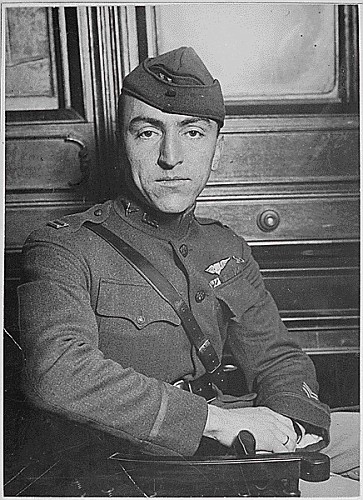 29, 1918, Rickenbacker shot down his first plane and claimed his fifth to become an ace on May 28. Rickenbacker was awarded the French Croix de Guerre that month for his five victories. 29, 1918, Rickenbacker shot down his first plane and claimed his fifth to become an ace on May 28. Rickenbacker was awarded the French Croix de Guerre that month for his five victories. On May 30, he scored his sixth victory. It would be his last for three and a half months. He developed an ear infection in July which almost ended his flying career and grounded him for several weeks. He shot down Germany's hottest new fighter, the Fokker D.VII, on September 14 and another the next day. On September 24, 1918, now a captain, he was named commander of the squadron, and on the following day, he claimed two more German planes, for which he was belatedly awarded the Medal of Honor in 1931 by President Herbert Hoover. After claiming yet another Fokker D.VII on September 27, he became a balloon buster by downing observation balloons on September 28, October 1, October 27, and October 30, 1918. Thirteen more wins followed in October, bringing his total to thirteen Fokker D.VIIs, four other German fighters, five highly defended observation balloons, and only four of the easier two-seated reconnaissance planes. The military determined ace status by verifying combat claims by a pilot, but confirmation, too, was needed from ground witnesses, affirmations of other pilots, or observation of the wreckage of the opposing enemy aircraft. If no witnesses could be found, a reported kill was not counted. It was an imperfect system, dependent on the frailties of human observation, as well as vagaries of weather and terrain. Most aces' records are thus 'best estimates', not 'exact counts'. Nevertheless, Rickenbacker's 26 victories remained the American record until World War II. Rickenbacker flew a total of 300 combat hours, reportedly more than any other US pilot in the war. When Rickenbacker learned of the Armistice, he flew an airplane above the western front to observe the ceasefire and the displays of joy and comradeship, as the formerly warring troops crossed the front lines and joined in the celebrations. |
| After World War I ended, Rickenbacker was approached several times about exploiting his fame. He chose to go on a Liberty bond tour. He was offered many movie positions, but did not want all the attention, even though he was the most celebrated aviator in America (soon to be supplanted by Charles Lindbergh after his solo flight across the Atlantic). Rickenbacker described his World War I flying experiences in his memoirs, Fighting the Flying Circus, published after the war. In this book, he also describes the character, exploits, and death of fellow pilot Lt. Quentin Roosevelt, the son of US President Theodore Roosevelt. Rickenbacker also continued to associate with Reed Chambers, with whom he had served in World War I; they jointly founded an airline. In 1925, Rickenbacker was a defense witness, along with Hap Arnold, Tooey Spaatz, Ira Eaker, and Fiorello H. La Guardia, in the court-martial of General Billy Mitchell. He started the Rickenbacker Motor Company in 1920, selling technologically advanced cars incorporating innovations from automobile racing. The Rickenbacker came equipped with the first four-wheel brake system. Probably due to bad publicity from the other car manufacturers, who feared they would be unable to sell their inventory of cars with two-wheel braking, the company had trouble selling its cars and eventually went bankrupt in 1927. Rickenbacker went into massive debt, but was determined to pay back all of the $250,000 he owed, despite personally going bankrupt (and therefore no longer being legally obligated to do so). Eventually, all vehicles manufactured in the US incorporated four-wheel braking. On November 1, 1927, Rickenbacker bought the Indianapolis Motor Speedway, which he operated for nearly a decade and a half, overseeing many improvements to the facility. Once the Speedway operations were under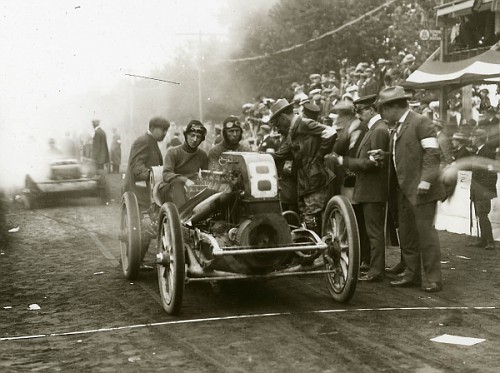 control, Rickenbacker looked for additional opportunities for entrepreneurship, including in sales for the Cadillac division of General Motors, and for various aircraft manufacturers and airlines. After the 500-mile (800 km) race in 1941, Rickenbacker closed the Speedway due to World War II. Among other things, holding the race would have been a waste of valuable gasoline and other fuels. In 1945, Rickenbacker sold the racetrack to the businessman Anton Hulman, Jr. control, Rickenbacker looked for additional opportunities for entrepreneurship, including in sales for the Cadillac division of General Motors, and for various aircraft manufacturers and airlines. After the 500-mile (800 km) race in 1941, Rickenbacker closed the Speedway due to World War II. Among other things, holding the race would have been a waste of valuable gasoline and other fuels. In 1945, Rickenbacker sold the racetrack to the businessman Anton Hulman, Jr. Rickenbacker was adamantly opposed to President Franklin Roosevelt's New Deal policies, seeing them as little better than socialism. For this, he drew criticism and ire from the press and the Roosevelt administration, which ordered NBC Radio not to allow him to broadcast opinions critical of Roosevelt's policies after Rickenbacker had harshly denounced the president's decision to rescind existing mail contracts in 1934 and have Army Air Corps pilots carry the air mail. At the time, Rickenbacker was vice president of one of the companies affected, Eastern Air Transport. When a number of inexperienced, undertrained army pilots were killed in crashes soon afterward, Rickenbacker stated, "That's legalized murder!" Rickenbacker's most lasting business endeavor was his longtime leadership of Eastern Air Lines. Through the 1920s, he had worked with and for General Motors (GM): first as the California distributor for its new car, the short-lived Sheridan, then later as a marketer for the LaSalle, and finally as vice president of sales for their affiliate, Fokker Aircraft Company. He persuaded GM to purchase North American Aviation, a conglomerate whose assets included Eastern Air Transport. GM asked him to manage Eastern, beginning in 1935. With the help of some friends, Rickenbacker merged Eastern Air Transport and Florida Airways to form Eastern Air Lines, an airline that eventually grew from a company flying a few thousand miles per week into a major airline. In April 1938, after learning that GM was considering selling Eastern to John D. Hertz, Rickenbacker met with GM's Chairman of the Board, Alfred P. Sloan, and bought the company for $3.5 million. Rickenbacker oversaw many radical changes in the field of commercial aviation. He negotiated with the US government to acquire air mail routes, a great advantage to companies in need of business. He helped develop and support new aircraft designs. Rickenbacker bought the new, large, faster airliners for Eastern Air Lines, including the four-engined Lockheed Constellation and Douglas DC-4. Rickenbacker personally collaborated with many of the pioneers of aviation, including Donald W. Douglas, the founder of the Douglas Aircraft Company, and the designer and builder of the large, four-engined airliners, the DC-4, DC-6, DC-7, and DC-8 (its first jet airliner). Rickenbacker promoted flying to the American public, but, always aware of the possibility of accidents, he wrote in his autobiography, "I have never liked to use the word "safe" in connection with either Eastern Air Lines or the entire transportation field; I prefer the word 'reliable'." |
| Rickenbacker supported the war effort as a civilian. In 1942, he toured training bases in the southwestern United States and in England. He encouraged the American public to contribute time and resources, and pledged Eastern Air Lines equipment and personnel for use in military activities. Rickenbacker inspected troops, operations, and equipment, and served in a publicity function to increase support from civilians and soldiers. In 1942, with a sweeping letter of authorization from Henry L. Stimson, US Secretary of War, Rickenbacker visited England on an official war mission and made ground-breaking recommendations for better war operations One of Rickenbacker's most famous near-death experiences occurred in October 1942. He was sent on a tour of the Pacific Theater of Operations to review both living conditions and military operations, and also to deliver personally a secret message to General Douglas MacArthur from the President. After visiting several air and sea bases in Hawaii, Rickenbacker was a passenger in the B-17D Flying Fortress numbered 40-3089, which strayed hundreds of miles off course while on its way to a refueling stop on Canton Island in the Central Pacific Ocean. The B-17 was forced to ditch in a remote and little-traveled part of the Central Pacific. The failure in navigation has been ascribed to an out-of-adjustment celestial navigation instrument, a bubble octant, that gave a systematic bias to all of its readings. That octant reportedly had suffered a severe shock in a pre-takeoff mishap. This unnecessary ditching spurred on the development of improved navigational instruments and also better survival gear for the aircrewmen. The B-17's pilot-in-command, Captain William T. Cherry, Jr., was forced to ditch his B-17 in the Pacific Ocean, rather close to Japanese-held islands, also. However, the Americans were never spotted by Japanese patrol planes, and they were to drift on the ocean for thousands of miles. For 24 days, Rickenbacker, the Army captain Hans C. Adamson, his friend and business partner, and the rest of the crewmen drifted in life rafts at sea. Rickenbacker was still suffering somewhat from his earlier airplane crash, and Capt. Adamson sustained serious injuries during the ditching. The other crewmen in the B-17 were hurt to varying degrees. The crewmen's food supply ran out after three days. Then, on the eighth day, a seagull landed on Rickenbacker's head. He warily and cautiously captured it, and then the survivors meticulously divided it into equal parts and used part of it for fishing bait. They lived on sporadic rain water that fell and similar food "miracles". Rickenbacker assumed leadership, encouraging and browbeating the others to keep their spirits up. One crewman, Alexander Kaczmarczyk of the USAAF, died and was buried at sea. The U.S. Army Air Forces and the U.S. Navy's patrol planes planned to abandon the search for the lost B-17 crewmen after just over two weeks, but Rickenbacker's wife persuaded them to extend it another week. The services agreed to do so. Once again, the newspapers and radio broadcasts reported that Rickenbacker was dead. A US Navy patrol OS2U-3 Kingfisher float-plane spotted and rescued the survivors on November 13, off the coast of Nukufetau in Tuvalu. All were suffering from exposure, sunburn, dehydration, and near-starvation. Rickenbacker completed his assignment and delivered his message to General MacArthur, which has never been made public. Rickenbacker had thought that he had been lost for 21 days, and wrote a book about this experience titled Seven Came Through, published by Doubleday, Doran. It was not until later that he recalculated the number of days, and he corrected himself in his autobiography in 1967. The pilot of the plane that rescued the survivors, Lieutenant William F. Eadie, USN, was awarded the Navy's Air Medal for his actions during the rescue. The story was also recounted in Lt. James Whittaker's book We Thought We Heard The Angels Sing, published in 1943. The story of Rickenbacker's ordeal has been used as an example for Alcoholics Anonymous when the first of their Twelve Traditions was formulated: "Our common welfare should come first. Personal recovery depends upon AA unity." |
| Still determined to support the US war effort, Rickenbacker suggested a fact-finding mission in the Soviet Union to provide the Soviets with needed technical assistance for their American aircraft. Rickenbacker approached Soviet diplomats, and avoided requesting help from President Franklin Roosevelt, due to their prior disagreements. With the help of the Secretary of War and by trading favors with the Soviet ambassador, Rickenbacker secured unlikely permission to travel to the Soviet Union. The War Department provided everything Rickenbacker needed, including a highly unusual letter stating that the bearer was authorized to "visit ... any ... areas he may deem necessary for such purposes as he will explain to you in person", signed by the Secretary of War. Rickenbacker's trip took him over South America, where he made observations about the conditions there. He stopped in Africa, China and India, at each stop reviewing American operations and making notes to report to authorities. In Iran, Rickenbacker offered to bring along an American officer, whose unapproved request to travel to the Soviet Union delayed Rickenbacker's party for a few days. In the Soviet Union, Rickenbacker observed wartime conditions, the extraordinary dedication and patriotism by the populace, and the ruthless denial of food to those deemed unproductive to the war effort. He befriended many Soviet officials and shared his knowledge of the aircraft they had received from the United States. He was lavishly entertained and recalled attempts by KGB agents and officials to get him intoxicated enough to disclose sensitive information. Rickenbacker's mission was successful. He discovered that a commander of Moscow's defense had stayed at Rickenbacker's home in 1937, and personal connections like this and the respect the Soviet military personnel had for him greatly aided his information-gathering. He learned about Soviet defense strategies and capabilities. In the distraction resulting from the outbreak of the Battle of Kursk, he saw a map of the front line showing the locations of all major Soviet military units, which he did his best to memorize. He also persuaded his hosts to give him an unprecedented tour of the Shturmovik aircraft factory. But it was comments made by Rickenbacker during his trip that alerted the Soviets to the existence of the secret B-29 Superfortress program. Rickenbacker observed some traces of capitalism (for example, people were allowed to grow food and sell their surplus) and predicted that the Soviet Union would eventually become a capitalist nation. British Prime Minister Winston Churchill interviewed Rickenbacker about his mission. In the US, Rickenbacker's information resulted in some diplomatic and military action, but President Roosevelt did not meet with Rickenbacker Although his main home was in New York City for many years, Rickenbacker owned a winter home in Coconut Grove, Florida, near the Eastern Air Lines' major maintenance and administrative headquarters at the Miami International Airport. For a time, Eastern was the most profitable airline in the postwar era. During the late 1950s though, Eastern Air Line's fortunes declined, and Rickenbacker was forced out of his position as CEO on October 1, 1959. Rickenbacker also resigned as the Chairman of the Board on December 31, 1963, at the age of 73. After that, Capt. and Mrs. Rickenbacker traveled extensively for a number of years. In the 1960s, Rickenbacker became a well-known speaker. He shared his vision for the future of technology and commerce, exhorted Americans to respect the enemy, the Soviet Union during the Cold War, but still uphold American values. Rickenbacker endorsed many conservative ideas. In 1967, when Rickenbacker published his autobiography, a special edition was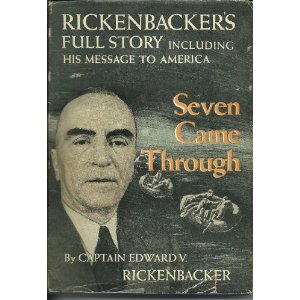 printed for the employees of Eastern Air Lines, and it contained the following dedication: printed for the employees of Eastern Air Lines, and it contained the following dedication:
To the Men and Women of Eastern Air Lines It is with pleasure and pride that I inscribe to you this copy of my life story from the time I was three years of age. You will find therein the source of those principles I used to preach; and if they can help you avoid even a few of the keen disappointments and bitter heartaches that I have lived through, then I will feel well repaid for my efforts. From these principles and our labors together emerged one of our country's great airlines and further developed our great heritage of pioneering. In the years ahead young, strong hands will carry them into a future which you and I, with all our dreams, can scarcely visualize---that "Parade of Youth" which always was and always will be the true spirit of Eastern Air Lines. (signed) Capt Eddie Rickenbacker
Capt. Rickenbacker suffered from a stroke while he was in Switzerland seeking special medical treatment for Mrs. Rickenbacker, and he then contracted pneumonia. Rickenbacker died on July 23, 1973 in Zürich, Switzerland, a memorial service was held at the Key Biscayne Presbyterian Church with the eulogy given by Lt. General Jimmy Doolittle, and then his body was interred in Columbus, Ohio, at the Green Lawn Cemetery. In 1977, at the age of 92, Adelaide Rickenbacker was completely blind, suffering from failing health, and still grieving severely from the loss of her husband. She committed suicide by gunshot at their home on Key Biscayne, Florida. |
|
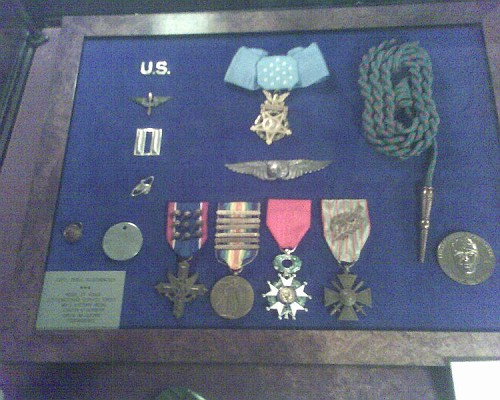
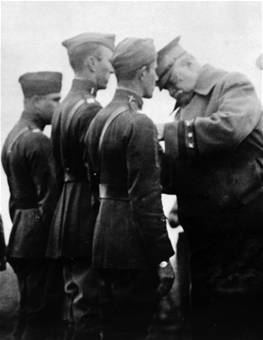 Medal of Honor Citation Medal of Honor Citation
Edward V. Rickenbacker, Colonel, specialist reserve, then first lieutenant, 94th Aero Squadron, Air Service, American Expeditionary Forces. For conspicuous gallantry and intrepidity above and beyond the call of duty in action against the enemy near Billy, France, September 25, 1918. While on a voluntary patrol over the lines Lieutenant. Rickenbacker attacked seven enemy planes (five type Fokker protecting two type Halberstadt photographic planes). Disregarding the odds against him he dived on them and shot down one of the Fokkers out of control. He then attacked one of the Halberstadts and sent it down also.
Medal of Honor citation, awarded November 6, 1930 First Distinguished Service Cross citation
The Distinguished Service Cross is presented to Edward Vernon Rickenbacker, Captain (Air Service), US Army, for extraordinary heroism in action near Montsec, France, April 29, 1918. Captain Rickenbacker attacked an enemy Albatross monoplane, and after a vigorous fight in which he followed his foe into German territory, he succeeded in shooting it down near Vigneulles-les-Hatton Chatel. General Orders No. 32, W.D., 1919
Second Distinguished Service Cross citation
The Distinguished Service Cross is presented to Edward Vernon Rickenbacker, Captain (Air Service), U.S . for extraordinary heroism in action over Richecourt, France, on May 17, 1918. Captain Rickenbacker attacked three Albatross enemy planes, shooting one down in the vicinity of Richecourt, France, and forcing the others to retreat over their own lines. General Orders No. 32, W.D., 1919
Third Distinguished Service Cross citation
The Distinguished Service Cross is presented to Edward Vernon Rickenbacker, Captain (Air Service), US Army, for extraordinary heroism in action over St. Mihiel, France, on May 22, 1918. Captain Rickenbacker attacked three Albatross monoplanes 4,000 meters over St. Mihiel, France. He drove them back into German territory, separated one from the group, and shot it down near Flirey. General Orders No. 32, W.D., 191
Fourth Distinguished Service Cross citation
The Distinguished Service Cross is presented to Edward Vernon Rickenbacker, Captain (Air Service), US Army, for extraordinary heroism in action over Boise Rate, France, on May 28, 1918. Captain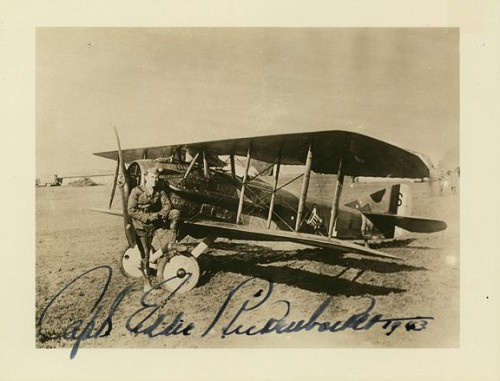 Rickenbacker sighted a group of two battle planes and four monoplanes, German planes, which he at once attacked vigorously, shooting down one and dispersing the others. General Orders No. 32, W.D., 1919 Rickenbacker sighted a group of two battle planes and four monoplanes, German planes, which he at once attacked vigorously, shooting down one and dispersing the others. General Orders No. 32, W.D., 1919
Fifth Distinguished Service Cross citation
The Distinguished Service Cross is presented to Edward Vernon Rickenbacker, Captain (Air Service), US Army, for extraordinary heroism in action on May 30, 1918, 4,000 meters over Jaulny, France. Captain Rickenbacker attacked a group of five enemy planes. After a violent battle, he shot down one plane and drove the others away. General Orders No. 32, W.D., 1919
Sixth Distinguished Service Cross citation
The Distinguished Service Cross is presented to Edward Vernon Rickenbacker, Captain (Air Service), US Army, for extraordinary heroism in action in the region of Villecy, France, September 14, 1918. Captain Rickenbacker attacked four Fokker enemy planes at an altitude of 3,000 meters. After a sharp and hot action, he succeeded in shooting one down in flames and dispersing the other three. General Orders No. 32, W.D., 1919
Seventh Distinguished Service Cross citation
The Distinguished Service Cross is presented to Edward Vernon Rickenbacker, Captain (Air Service), US Army, for extraordinary heroism in action in the region of Bois-de-Wavrille, France, September 15, 1918. Captain Rickenbacker encountered six enemy planes, who were in the act of attacking four Spads, which were below them. Undeterred by their superior numbers, he unhesitatingly attacked them and succeeded in shooting one down in flames and completely breaking the formation of the others. General Orders No. 32, W.D., 1919
|
| Please remember the Canteen is here to honor, support and entertain our troops and their families. This is a politics-free zone! Thanks for helping us in our mission! |
|
